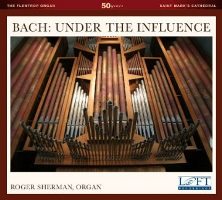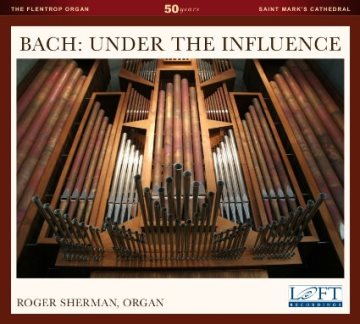— by Margie Doyle —
Orcas Island business Loft Recordings is pleased to release “Bach: Under the Influence,” a recording of the Sept. 20, 2001 concert of the same name at St. Mark’s Cathedral in Seattle. The concert, performed by Loft Recordings owner, Roger Sherman, came just 10 days after the airplane bombings of the World Trade Center in New York City, and of the Pentagon and the crash of a fourth hijacked plane in Pennsylvania, collectively referred to as “9-11.”
Though the concert had been planned months beforehand, Sherman’s comments to the Dean of the Cathedral then seem particularly relevant in 2015:
“We often think the opposite of war is peace, but peace is really just the absence of war. The opposite of war is art, the creation of culture.
“War is the destruction of another’s art, of culture. We create and perform concerts like ‘Bach: Under the Influence’ as a response to the destruction of 9/11.”
In “Bach: Under the Influence,” Sherman first performs works by composers who may have influenced Bach, and in the second half of the recording, music which Bach composed to influence others.
“Composer” connotes a modern understanding of a musician’s role and influence, Sherman says. In Bach’s time, musicians were often employed by royal and aristocratic courts, in a manner similar to modern ownership of sports teams. Thus, where we might observe the Seahawks vs the Cardinals, the sponsors of the 18th century were more likely to provide competitions between the German and the French styles of music, as personified by J.S. Bach and Louis Marchand; or between Handel’s German-English style in comparison to Scarlatti’s Italian style. Through the court “competitions” their music became known and their reputations were made and advanced.
During his lifetime (1685-1750), few of Bach’s musical compositions were published. This was especially true of his choral and vocal music—his largest body of compositions. As he neared the end of his life, only one of his cantatas, a very early work, had been published. As Bach approached old age (he died at 65), he began to write down and publish his compositions to establish his legacy and skill at composition. Late in his lifetime he was criticized for writing in an “old-fashioned” way that was too complicated and ornate for contemporary tastes.
The common notion that Bach’s work disappeared until the late 1800s is “only true in terms of the general population,” Sherman explains. German musicians in particular studied his work to learn the art of counterpoint — a style of writing music in which individual voices have the same musical theme, though often in different keys, but combined in a way that the music is still harmonious.
An organist himself since childhood, Sherman’s lifelong attachment to organs and choirs show his twin inclinations towards the art and culture of music and the engineering of sound production.
He describes the first concert, by E. Power Biggs, of the iconic, newly-installed Flentrop organ at St. Mark’s Cathedral in 1965 as a life-defining moment. Within the year, Sherman was playing the Flentrop in informal recitals after Compline services. In college, he studied with renowned organist Fenner Douglass at Oberlin. While there earning his Bachelor of Arts in Music Theory and History, he also studied world religions and computer science.
Sherman was also deeply drawn to engineering and technology from an early age. He built a computer in middle school and created a project in particle physics in the 9th grade. He also worked for Microsoft as a director of testing for the Windows 95 and Office 95 program releases. He was on the teams that produced the first versions of Publisher, Windows Works and Microsoft Money.
He still sings occasionally with the Cathedral choir and Compline choir at St. Mark’s “It’s been a spiritual home for me,” he’s said.
Sherman founded Loft Recordings in 1999; in 2001, he purchased the assets of Gothic Records, a company which had been producing great organ and choral recordings for almost 25 years. Loft established “The Gothic Catalog” as a mail-order webstore where recordings from both companies could be showcased, alongside other recordings. In June 2008, he acquired Clarion Records.
And five years ago, he became the Artistic Director of the Orcas Choral Society. “Singing together is a way in which we can model — and more importantly — experience a harmonious relationship with each other and the world,” he has said.
“I value the opportunity to be artistic director; to do a wide variety of music, including works with orchestra and chorus and original works. And I enjoy the interactions with the choir. They have become my community on Orcas.”
The mission of Loft Recordings is “to generate literacy and enthusiasm in classical music, particularly music for organs and choirs,” matching premiere organists and choirs; with premiere instruments of historical importance and premiere recording technology.”
“Bach: Under the Influence” is a great representative of that mission and is one of many concerts of Bach’s work performed by Sherman during the 50 years of the Flentrop organ at St. Mark’s. The recording is dedicated to the memory of Glenn White and Fenner Douglass. The front cover is a near-replica of the first LP record album recording on the St Mark’s Flentrop organ, made by Fenner Douglass and recorded by Glenn White. The CD is available at Darvill’s Bookstore and through the website https://www.gothic-catalog.com/
Sherman plans to release other recordings in this series celebrating the 50th anniversary of the Flentrop organ at St. Mark’s Cathedral. Next in line is “Famous and Infamous Works for the Trumpet and Organ,” with trumpeter Fred Sautter. Among the famous works are Bach’s “Toccata and Fugue in D Minor, and the Rondeau by Jean-Joseph Mouret which is the Masterpiece Theater theme. The “infamous” piece is a highly theatrical depiction of the fall of Jericho by William Albright.
An important aspect of Sherman’s work and reputation is the recording production he engineers all over the world, from Yokohama to Gothenburg to Oaxaca to Atlanta and beyond in all directions.
Sherman is particularly dedicated to “live” performances, as opposed to in-studio recordings; he values reproduction of “real stereo enveloping sound.” He can be counted upon to show up with the equipment, and to record performances in the real acoustical space of churches and concert halls.
He also hosts “The Organ Loft” radio show on 98.1 KING FM, heard Sunday evenings at 10 p.m. for more than 20 years. He remains dedicated to the mission of Loft Recordings: “to generate literacy and enthusiasm in classical music, particularly music for organs and choirs.”
**If you are reading theOrcasonian for free, thank your fellow islanders. If you would like to support theOrcasonian CLICK HERE to set your modestly-priced, voluntary subscription. Otherwise, no worries; we’re happy to share with you.**










I’m very proud of my son, Roger. Ruth McCormick
Congratulations Roger!
The organ on the album is so clear and AMAZING – truly a masterpiece.